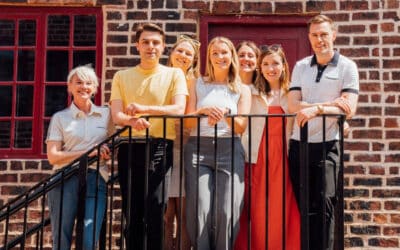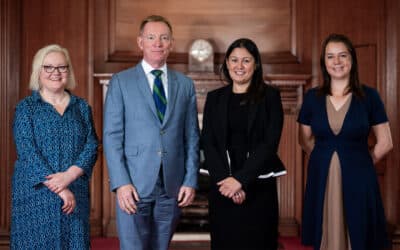In the heart of Manchester at Bruntwood SciTech’s No.1 Circle Square, digital and tech leaders across the North came together for the opening event of Digital City Festival 2024.
David Prior, editor at Prolific North, welcomed attendees to the Digital Leaders Summit & Reception on 15 April and gave a special thanks to the festival’s headline partner MediaCity, education partner Access Industry, and event partners and supporters GFT, Manchester City Council and Greater Manchester Combined Authority.
The event kicked off with a reflection on the region’s journey to becoming a world-leading digital city and how critical digital is to the North’s growth during a panel discussion on This is the place: Greater Manchester doing digital differently.
Panel chair Phil Swan, Director of Digital at Greater Manchester Combined Authority, was joined by Liz Scott MBE, Director at Turing Innovation Catalyst; Carl Jones, Chief Strategy Officer at Cloud Imperium Games; and Jess Jackson, Investment Manager at Praetura Ventures.
Phil Swan (Greater Manchester Combined Authority – GMCA) described Manchester as the largest tech hub outside of London, adding that it is an “amazingly exciting time to work in digital and tech in Greater Manchester”. Although there may be challenges, there are plenty of opportunities across the region too.
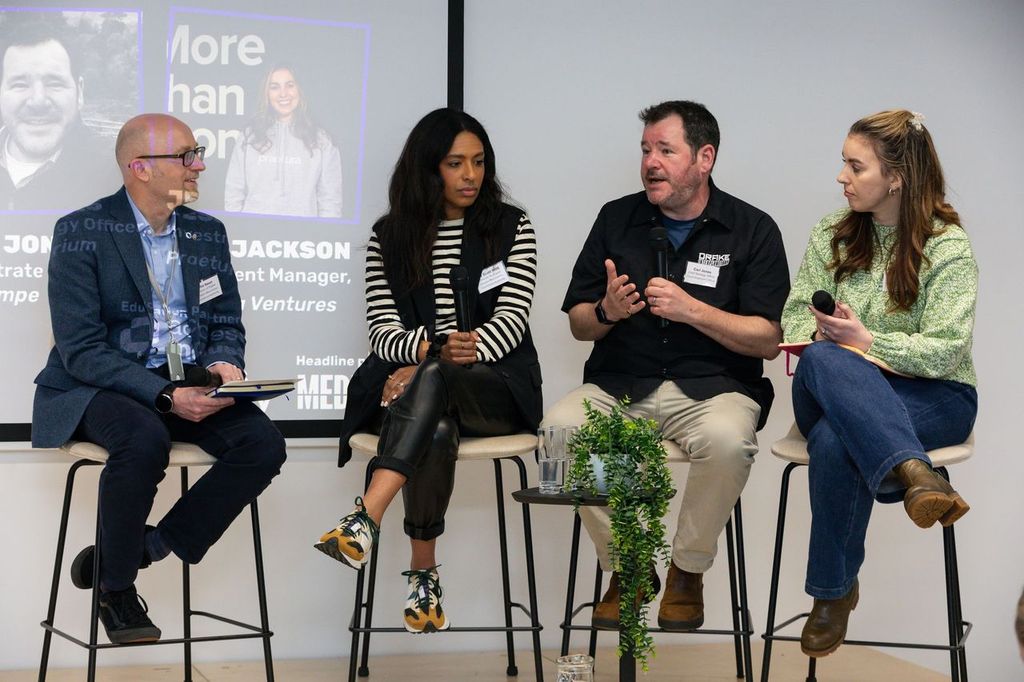
As a leading figure immersed in the region’s digital and tech ecosystem for the past decade, Liz Scott now leads Turing Innovation Catalyst (TIC), a new not-for-profit organisation that’s “driving forward the AI ecosystem in Manchester”.
Reflecting on how Greater Manchester does things differently, she explained how the region’s universities are all doing “incredible things” with TIC being incubated within the University of Manchester.
Major video games development studio Cloud Imperium Games, behind the Star Citizen game, moved to its hub at Enterprise City around 2022. With over 500 staff now based in Manchester, it’s now the company’s “biggest hub” globally, said Carl Jones. Having been in the games industry for over 30 years, he reflected on how Cloud Imperium Games has raised over £500m via crowd funding meaning the company can “take more risks and be independent”.
Praetura Ventures was recently unveiled as the North West equity partner for The Northern Powerhouse Investment Fund II (NPIF II). As a Northern focused VC already with a portfolio of scaling businesses including Peak AI, Modern Milkman and Seatfrog, the focus is now on growing PraeSeed to deploy equity investment into early stage businesses in the North. It was launched to “answer the rally cry from early-stage companies unable to access capital”, explained Jackson.
On the biggest challenges for digital and tech companies across the region, Jones (Cloud Imperium Games) said it’s all getting the “right talent in”. Manchester’s thriving talent pool appears to be “drying up” and it needs to become more affordable again to support smaller businesses and entrepreneurs to set up in the region.
The decision to move from “sleepy Wilmslow” to Manchester “made sense”, especially for younger staff. But if Manchester is to become more attractive, it “needs more incentives” that cities such as Montreal offer the games sector in the form of tax relief.
But is this picture now changing, Swan asked the panelists. On investment, Jackson (Praetura Ventures) said some may say it’s “rosy” but when you drill into the numbers, company life cycles and commercial traction, it’s clear many are “crying out for more funding”.
In 2023, VC investment was down 20% on pre-pandemic levels and last year was “even worse”. With tech layoffs happening globally, it’s still harder to raise more funds and underrepresented founders are “still struggling”. Despite this, although inflation is “still really high” things are becoming more stable.
Manchester’s tech and digital ecosystem has had “bits of the puzzle”, explained Scott (TIC) and investors are choosing to set up in the city as they have “fomo – fear of missing out”.
“It feels like a big moment in Manchester, we’ve never had a whole spectrum of opportunities here”, she explained. “For ecosystem nerds, it feels like Christmas has come early”.
Jackson agreed, pointing to the likes of Baltic Ventures over in Liverpool and Fraser House Hub. “It feels like something new is launching each week. It’s very important to each have a piece of the puzzle.”
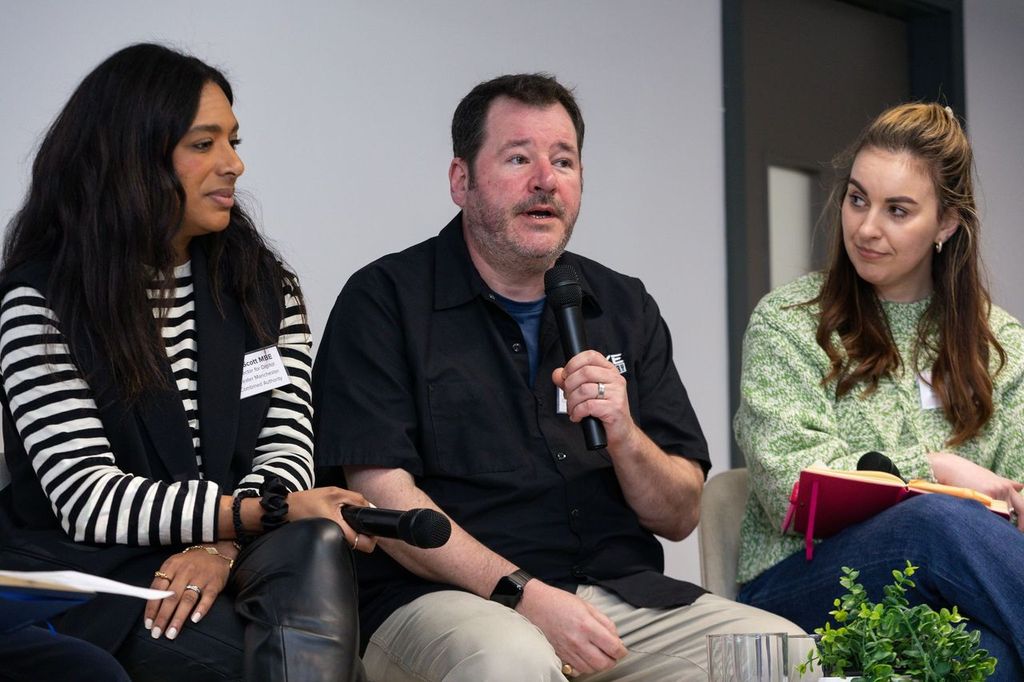
On training up the digital workforce and pressures on talent, Scott said TIC has been “massively oversubscribed” for its portfolio of skills programmes. There’s a “big demand” for insights into what AI will mean for anything from HR to marketing.
Another big challenge is how expensive the city is becoming, meaning salaries now need to match rent demands. Transport “should be easier in this city”, added Jones (Cloud Imperium Games). Having a unified transport system, similar to London with oyster cards, is vital for a company like Cloud Imperium Games to be able to offer staff incentives such as tickets for transport. “I hope that’s coming. It would make a huge difference to us.”
With the “biggest AI hub in the country”, Swan (GMCA) asked about other exciting developments for Manchester’s digital landscape over the coming years.
Jackson (Praetura Ventures) said she’s excited to see what the VC firm will build through PraeSeed and uncover who the “next Northern stars will be”. For Jones, Cloud Imperium Games hinted at a major event later this year which is set to be a “perfect opportunity” to showcase of what the region has to offer and forge better connections across the ecosystem.
“We are at a turning point,” explained Scott (TIC), thanks to the region’s growing investment landscape and the likes of Cloud Imperium Games and other global tech companies based across the city.
It’s only “getting much bigger with new ingredients and more perspectives than ever before,” she said. “Imagine what we could do now with new, raw ingredients? I’m genuinely excited about what comes next”.
Delving into AI
Dr Alastair Gill, Principal Data Scientist at GFT and Heather Statham, Principal Consultant at GFT, took to the stage next to go beyond the AI hype by presenting the latest trends and financial services use cases in AI and machine learning.
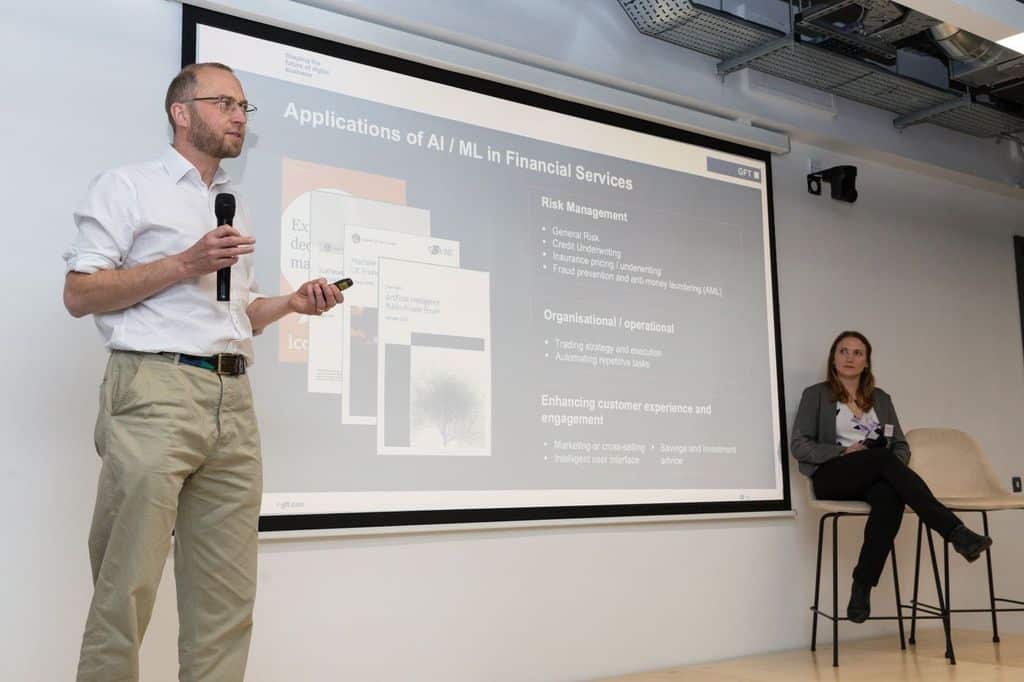
Statham kicked off the session with an overview of GFT, a global organisation with a primary focus on digital transformation in banking, and explained how GFT recently partnered with Starling Bank as an implementation partner for its Software-as-a-Service business, Engine by Starling.
Although Generative AI took the world “by storm”, in the financial services sector it is still “emerging” with opportunities for growth. By showcasing the importance of AI and ML in financial services, it can offer “rich opportunities” to automate routine tasks and improve customer experience, marketing or the ways of advising customers, explained Gill.
Following an overview of case studies, he explained how machine learning algorithms can be implemented to monitor “billions of transactions” in moments.
Now with major benefits for the financial services sector from voice surveillance to assessing credit risks, encoding information using large language models was something GFT was developing “even before ChatGPT” emerged, he explained.
“Years ago it would be unthinkable that you’d have access to powerful technologies at your finger tips. Businesses of all sizes will be figuring out what they want to do. Smaller organisations can experiment, seize opportunities and try things out. We would encourage exploring that,” said Gill. If you’re keen to explore more, download GFT’s latest paper here.
Manchester’s start-up ecosystem and how we invest and fund its success
Next up was an insightful panel discussion delving into Manchester’s start-up ecosystem, chaired by Angela Harrington, Director of Inclusive Economy at Manchester City Council.
She was joined by a panel of experts including George Mensah, VC Investor at Sure Valley Ventures; David Levine, Principal of Manchester Angels; Katie Gallagher OBE, Managing Director of Manchester Digital; and Liz Scott MBE, Director at Turing Innovation Catalyst (TIC).
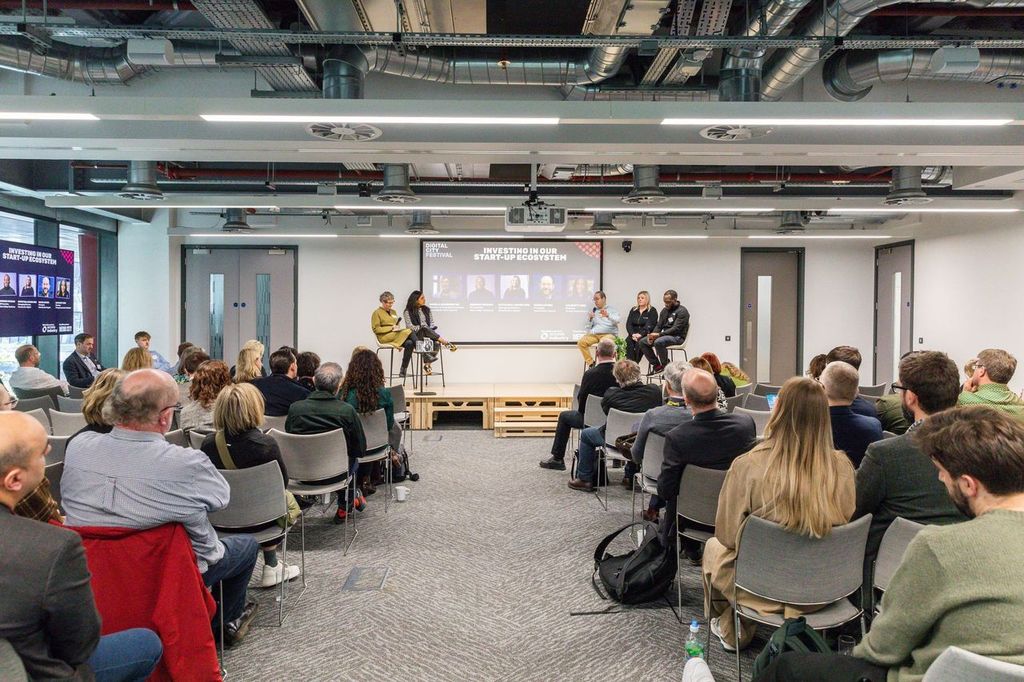
Providing an overview of Manchester’s start-up ecosystem, Katie Gallagher (Manchester Digital) reflected on a “turbulent year” where growth has slowed. Despite major redundancies across fintech, with some businesses grappling with economic instability, Manchester has “earned its reputation” as a tech destination and is able to “weather most circumstances”.
There has been a “groundswell” of activity from TIC’s view, explained Liz Scott, and that picture is “starting to come to life”.
The investment landscape is not without its challenges either, added George Mensah (Sure Valley Ventures), but there is now a “heightened interested in Manchester” from VCs and angel investors based in London looking to understand the ecosystem in the North.
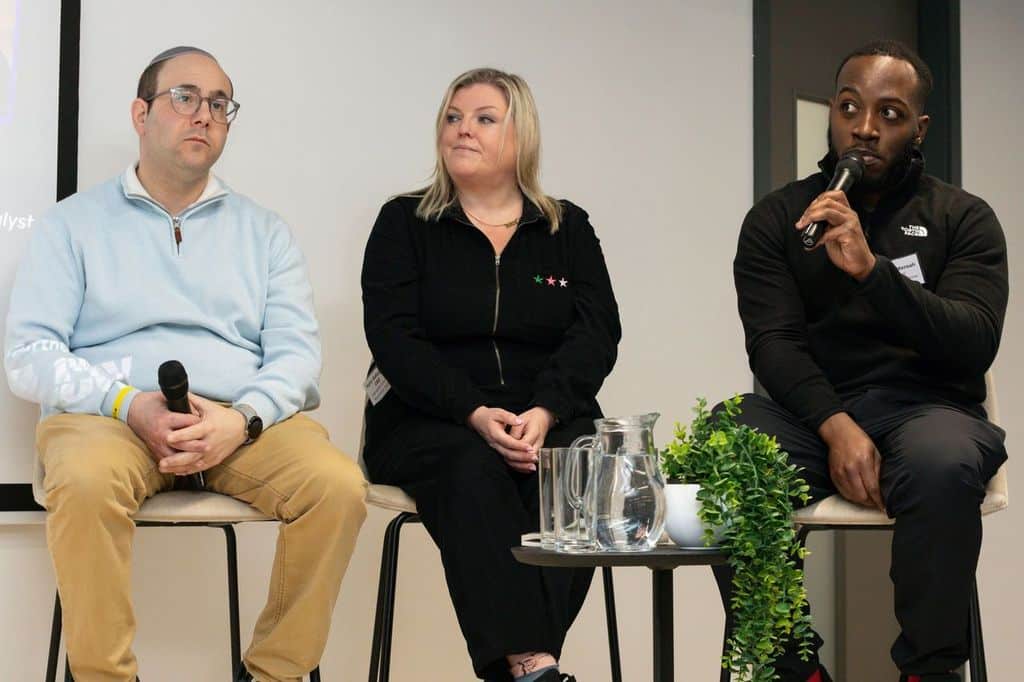
“We are demonstrating ambition to attract investment. If the local ecosystem demonstrates that, the capital will come. It may not be easy but it will happen,” he explained.
There is “a lot of capital in Greater Manchester but many founders feel there isn’t,” said David Levine (Manchester Angels). The struggle is often over the quality of pitches from founders, however this picture is improving.
“It’s already better this year, there’s more appetite for investors to deploy capital,” he explained. “Businesses are more educated on what people are looking for and able to articulate what they do.”
Angel investors and VC firms are looking for founder market fit, if the market is big enough, and if it’s a problem that needs solving, he added.
Although he was reluctant to draw parallels with Silicon Valley, Mensah (Sure Valley Ventures) explained how it set a blueprint with how universities, spinouts and pension funds work together. It’s a “massive missing piece” in Greater Manchester and could play a “big role” in ushering in a more cohesive ecosystem not just in the region, but across the UK too.
Scott (TIC) hopes more reforms will come through and said the role of university spinouts is “very important”. If it can be fixed locally it will “stand us in good stead”, referencing UA92 as an innovative model from an education perspective.
What’s “really exciting” now is talent is moving up from London to set up in Manchester, said Mensah (Sure Valley Ventures) It’s a “window of opportunity Manchester needs to capture to create an ecosystem of consequential tech companies”.
For Levine (Manchester Angels), AI can “unlock power” and “democraticises the ability for people to step up on the world stage”. Manchester boasts big data companies such as Peak AI and Matillion, elsewhere there aren’t many of these types of clusters. With talent, universities and investment in the region, it presents an opportunity for the region.
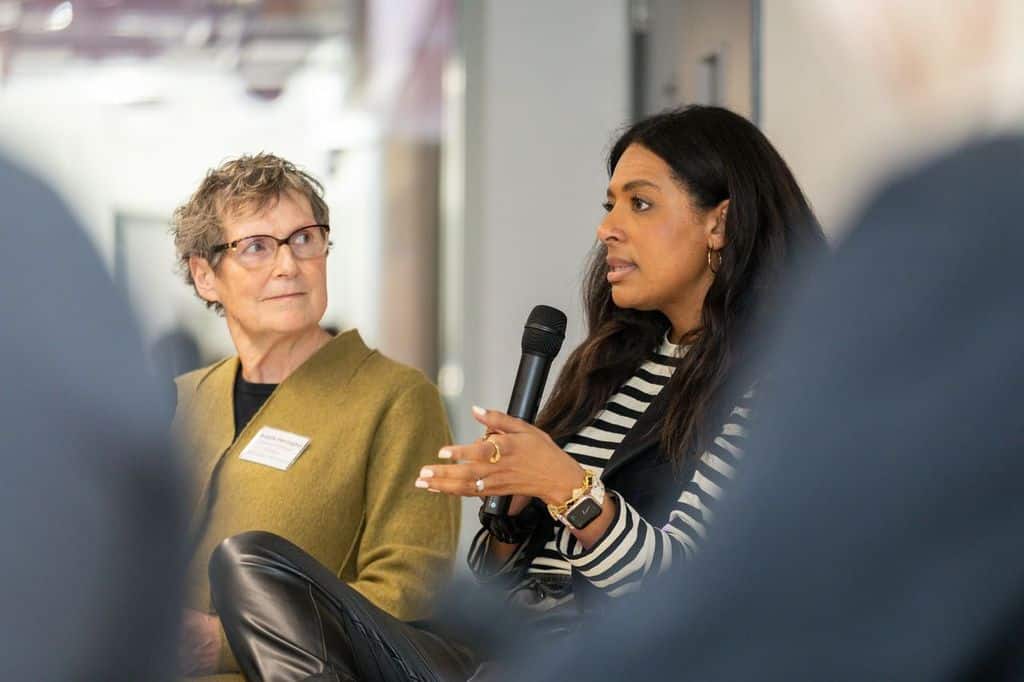
Scott (TIC) said she’s “excited” by some of the innovations that are coming through, all solving “very important world issues”.
Over the next five years, Mensah (Sure Valley Ventures) said his dream is to back the next AI unicorn based in the North. Gallagher (Manchester Digital) has ambitions that Greater Manchester will be able to solve big challenges with tech. Levine (Manchester Angels) teased he would like to see the world’s first one-person unicorn using AI to do everything other than their role.
From an AI perspective Scott (TIC) said this is now the moment for companies and individuals to harness its capabilities. “We know we have a long way to go, we want Greater Manchester to have more than its fair share.”
Strengthening our digital talent pipeline
Addressing the digital pipeline across Greater Manchester, there was a fascinating discussion with Jason Beaumont, Chief Executive at Access Industry; Amul Batra co-founder & chief partnerships officer at Northcoders; and Charli Wild, software engineer and academy lead at Krakenflex (Octopus Energy).
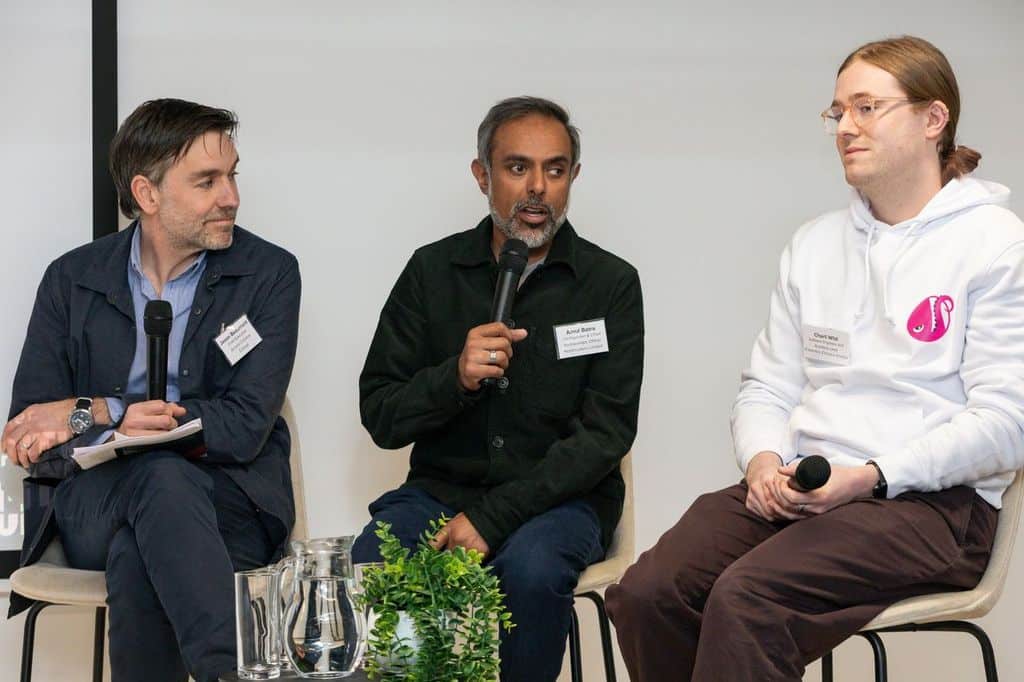
From an educators point of view on the state of the jobs market, Jason Beaumont (Access Industry) said he’s seen lots of students moving to Manchester who see the city as an “opportunity” to land jobs. From an employers view, one of the biggest challenges is around pay.
Amul Batra (Northcoders) explained the company’s strong partnership with employers. Last year was a “challenge” but there has never been a lack of demand for talent emerging from Northcoders who have skills across data, engineering or software.
As alumni from Northcoders, Charli Wild (Krakenflex) said the landscape was “very different” seven years ago. Back then, he felt like he “walked into a job” with employers wanting to interview him. At Krakenflex, it’s very competitive at the academy and the quality of junior developers is now “a lot higher than five or six years ago”, employer expectations are higher too which is beneficial for the sector as a whole.
Beaumont (Access Industry) isn’t a fan of the word ‘soft skills’ as it’s “often the most important skill” to provide people with confidence and ambition.Collaboration with employers, especially around designing course curriculum or offering work experience, is “really important for young people” as it gives them a glimpse into what they can expect.
“In Greater Manchester, it is a city where people want to stay and work so the more collaboration, the better.”
Over at Northcoders, it’s not necessarily about young talent explained Batra, as the average age of talent is 30 plus from non tech backgrounds. Career changers are “very appealing to employers”. He added: “We designed the courses to be appealing to as many tech houses as possible. We don’t teach people to code, we teach them to teach themselves to code.”
With the landscape moving so fast in tech, David Prior (Prolific North) asked how talent can continue to adapt. Trust plus the autonomy to learn is key, explained Wild (Krakenflex). Making sure the curriculum is solid is vital to ensure people are equipped to keep up with the fast-paced nature of the industry, added Beaumont (Access Industry).
There is “lots of collaboration and innovation” in Manchester when it comes to talent, explained Beaumont (Access Industry). It’s something that Greater Manchester seems to have “cracked” but there needs to be more lobbying for funding for places for 16 to 18-year-olds. Batra (Northcoders) agreed but said it’s “exciting” what’s happening in Greater Manchester now with a devolved budget.
How do we keep digital cities safe?
To wrap up the day, we delved into an increasingly important topic in today’s world looking at how we can keep digital cities safe during a panel session with Sameena Khan, Director Partnerships and Community at IN4 Group; Matthew Squire, CTO of Fuzzy Labs; and Emma Green, Managing Partner at Cyber Data Law Solicitors.
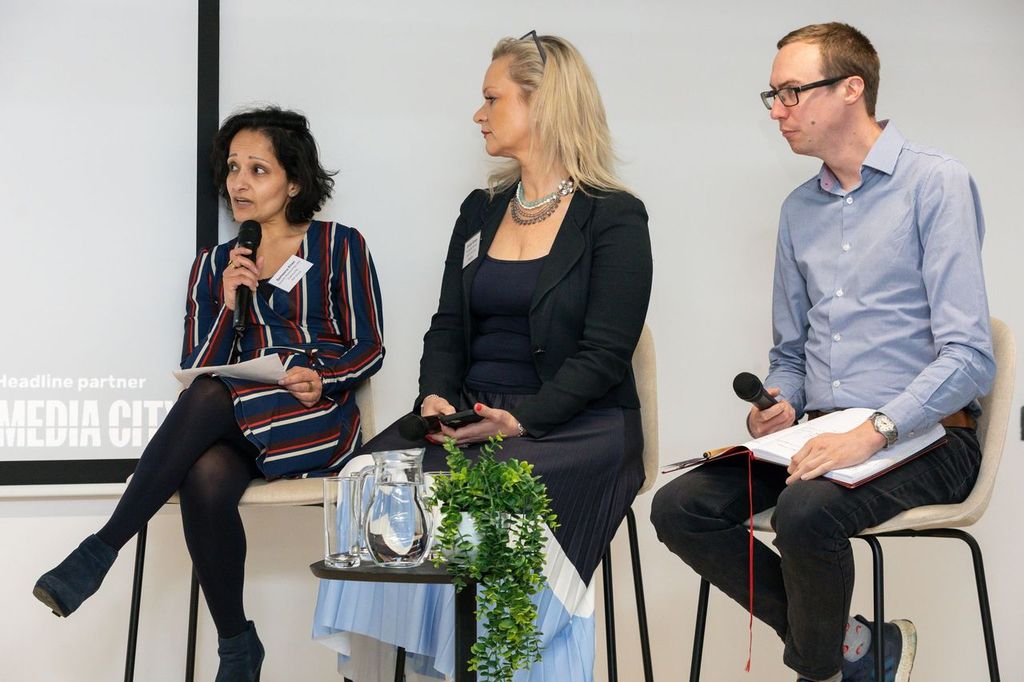
Sameena Khan (IN4 Group) previously worked at GCHQ and shared her extensive knowledge over the difficulties cities now face. From a national security perspective, obvious threats persist from China, Russia and most recently, Iran. Online fraud, cybersecurity and threats around disinformation especially as elections loom, are also growing challenges.
With the emergence of AI, Matthew Squire (Fuzzy Labs) said there are a number of issues it poses from a safety point of view such as trust, accountability and security.
Emma Green (Cyber Data Law Solicitors) said compliance with regulation and legislation is “often an afterthought” following a security breach. It goes beyond a privacy notice on a website. Regulators such as the ICO are “very active” behind the scenes as Cyber Data Law Solicitors often defends a number of notices of intent to fine. It needs to be at the “forefront” and companies need to ensure its embedded from the beginning.
Vulnerabilities are one of the consequences of AI on cybersecurity, explained Khan (IN4 Group). For Squire (Fuzzy Labs) cybersecurity for AI is a “brand new thing”. Add Generative AI to that, it starts to create a “real problem”. It’s a “big challenge” but there now needs to be more skills specifically in cybersecurity as it applies to AI.
There are “huge amounts of investment” in this area, said Green (Cyber Data Law Solicitors) such as DiSH creating a “hot house of collaboration for cyber talent”.
Collaboration is key too, said Khan (IN4 Group). When GCHQ landed in Manchester in 2019 it was the “catalyst for things starting to happen”. Thanks to the North West Cyber Corridor, industry, academia and the public sector are coming together to look at challenges. That collaboration has been “instrumental” for the growth journey of Fuzzy Labs, explained Squire.
Although there’s currently a private members’ bill attempting to tag AI on, there is still no legislation for AI yet said Green (Cyber Data Law Solicitors). “If we are not careful, we will be behind the curve.”
Thanks to the National Cyber Force partnership between GCHQ and the MOD, there are around 3,000 jobs coming to the North West explained Khan (IN4 Group). The decision to come to the region was deliberate partly due to its “diverse talent, skills, universities in the region and talk of levelling up,” she added.
On the one piece of advice the panelists would give to leaders, Squire (Fuzzy Labs) urged that security should not be “an afterthought”.
“Privacy be design and default, have frameworks in place,” added Green (Cyber Data Law Solicitors). For Khan (IN4 Group), leaders should “not underestimate the pace of change in tech. It’s not going to slow down”. Now working for IN4 Group, she explained the importance of talent and how companies and leaders must work collaboratively to navigate these future challenges.
“We need support from industry and academia. Diverse talent doesn’t just happen, you have to create those opportunities and they have to be fit for purpose.”
There are still plenty of exciting events to look forward to across Digital City Festival week until 19 April. Make sure you keep up to date with what’s happening across Digital City Festival’s what’s on page here.
Headline partner
Education partner
Event Partners and Supporters

